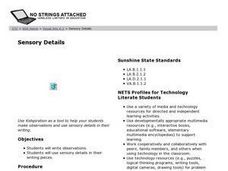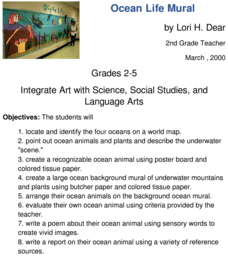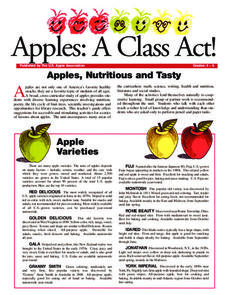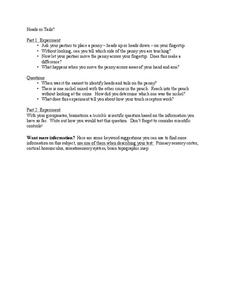Curated OER
"Snapshot" Exercises & Sensory Detail Word Bank
Read a sample of creative descriptive writing to your science class. Discuss how writing can be used to record and communicate observations that scientists make. Reading selections and thought-provoking questions are suggested. Also...
Curated OER
A Seashell Lesson: Writing for Detail and the Scientific Process
Practice descriptive language in this lesson, which prompts elementary and middle schoolers to write detailed descriptive sentences describing a seashell. They write a description of a shell, create an illustration, and other students...
Education Outside
Garden Detective Sensory Tour
To prepare for a sensory walk outside, the whole class engages in a discussion of the five senses, kids close their eyes, and share what they sense. Groups then follow a guide, tour an area, and share what they experience...
Space Race
Sensory Detectives
Test your learners' sensory awareness with three hands-on activities that ask pupils to use their other senses to identify and describe everyday objects hidden from sight.
Curated OER
Sensory Details
Students observe their environment and write detailed, sensory-specific sentences about that environment. This lesson can be extended to include the creation of a personalized story or movie of the experience (student examples are...
Curated OER
Sensory and Motor Mechanisms
Advanced biology pupils name the function of each individual structure on figures of the eye and the ear. They describe the purpose of the skeleton and how it works with the muscles to create movement. Finally, they label a large diagram...
National Wildlife Federation
Sensory Discovery Walk
Let your senses be your lead. Pairs of pupils blindfold their partners and then lead them around nature areas. They use their senses to find landmarks and create maps with their findings. Once they create their maps, they go back to the...
National Wildlife Federation
Sensory Discovery Walk: Connecting With Your Place
Take a blinded tour. Pairs take turns leading each other on a blindfolded exploration of the natural world and take stock of their surroundings using their remaining senses. After the tour, pupils try to map their paths and follow them...
Captain Planet Foundation
Sense of Place
Explore the five senses with a kindergarten lesson on gardening. After taking a walk through the class garden, kids note what they see, hear, feel, taste, and smell, and then decide what is living in the garden versus what is not living....
Curated OER
Ocean Life Mural
How many oceans can you name? First, have learners try to name as many oceans as they can, and then have them locate and identify the oceans on a world map. They create a recognizable ocean animal using poster board and tissue paper....
Curated OER
Essential Elements of Habitat
First graders compare their local area with the Belize landscape. They construct maps of the school area, adding descriptive information. They write haiku poems about their favorite outside places.
University of Minnesota
Chemotaxis Using C. elegans
Have you ever wondered what roundworms are like? Or what they don't like? Explore the sensory preferences of C. elegans through this controlled chemotaxis experiment. Biology class members brainstorm what substances might attract—or...
Biology Junction
Mollusks
Mollusks created every shell on Earth. Young scientists learn more about the phyllum mollusca in an informative presentation. It covers their characteristics, body plans, and relationships in the ecosystem. Then, it details each class of...
US Apple Association
Apples: A Class Act! (Grades 4–6)
Middle schoolers have a bushel of fun as they engage in activities and research core facts about apples. Packed with suggestions for in-class activities and out-of-class research, the colorful 6-page packet is sure to satisfy hungry...
Curated OER
Trees
Students explore tree species based on their features. For this tree lesson, students visit a wooded area and work with a partner to describe distinctive features of trees using all of the senses except "sight." A discovery worksheet...
Rainforest Alliance
Knowing the Essential Elements of a Habitat
To gain insight into the many different types of habitats, individuals must first get to know their own. Here, scholars explore their school environment, draw a map, compare and contrast their surroundings to larger ones. They then...
University of Minnesota
Heads or Tails
How exactly does touch help us identify items? Students test this question by feeling a coin without moving their fingers and trying to determine if it is heads or tails. They test their accuracy by rubbing their...
University of Minnesota
Mirroring Emotions
Do you ever give your class the "teacher look"? Without saying a word, they become silent and engaged (hopefully). How do they know what you're thinking? Explore the concept of nonverbal communication and how it relates to our...
Berkshire Museum
Nature Journaling: Experience the Outdoors Through Writing and Drawing
Step into the great outdoors and develop young scientists' skills of observation with a nature journaling lesson. Given a specific focus or goal, children practice making and recording observations of nature through written descriptions...
Biology Junction
Annelids: The Segmented Worms
Here's a lesson that just might make your class squirm! Learn about segmented worms in a detailed PowerPoint presentation including the wriggly earthworms young scientists dig up in their backyards. Although seemingly simple creatures,...
Biology Junction
World of Insects: Characteristics, Orders, and Collecting
Every bug is an insect, but not all insects are bugs. A presentation lists the characteristics of insects, describes their body parts, and explains metamorphosis. It also details every order and includes photographs and multiple facts...
Curated OER
Five Senses and Four Seasons Quilt
Students explore the four seasons and the ways that their five senses give them information about each of the seasons. They work in groups to create a class quilt with one block for each season. Each block should include sensory details...
Pleasant Valley Community School District
Integumentary System
This document can be used as a slide show to introduce your human body systems class to the integumentary system, also know as skin. Topics outlined include the roles of skin, details about its its layers, and color (cause and...
Discovery Education
Sonar & Echolocation
A well-designed, comprehensive, and attractive slide show supports direct instruction on how sonar and echolocation work. Contained within the slides are links to interactive websites and instructions for using apps on a mobile device to...
Other popular searches
- Sensory Details in Writing
- Sensory Details Poems
- Sensory Details Chart
- Sensory Details Poetry
- Using Sensory Details
- Teaching Sensory Details
- Adding Sensory Details
- Sensory Details in Poems
- Observing Sensory Details
- Sensory Details Project
- Sensory Details and Writing
- Author Using Sensory Details























